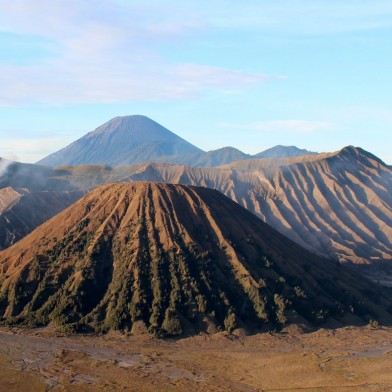Indonesian President Joko Widodo promoted the value of “coffee diplomacy” during his visit to New Zealand in March. If anyone understands the true meaning of the term, it’s Indonesian coffee entrepreneur Indradi Soemardjan.
Visiting Wellington from Singapore in early April, Indradi “Indi” Soemardjan passed an entire morning sitting watching customers in Hauora Café, situated within the Ministry of Health building.
“I was just observing the response to the coffee because it was from Indonesia, West Java. I was surprised by the number of cups served in a day, more than 400 cups in that store alone.
“I knew some of the baristas already, but I was impressed by their knowledge. They know about the origins of the coffee and all that – it’s not just latte art.”

Indi Soemardjan trying his hand at roasting West Java beans at Ripe Coffee Company in Petone, Wellington. (Photo: Ripe Coffee)
Hauora Café is owned by Ripe Coffee, which has been importing and roasting beans from Soemardjan’s company PT Javanero, for several years. The Arabica beans are grown in shade-covered plantations in the mountains of West Java.
Soemardjan’s relationship with New Zealand began in 2014, when he was invited to New Zealand to be part of the ASEAN Young Business Leaders Initiative. He met Ripe owner and director Jason Hall during a coffee cupping session at the Indonesian Embassy.
Soemardjan later sent his first shipment of West Java beans to Ripe, and not long after, Hall and a roaster visited West Java.
PT Javanero has benefited from the close relationship it enjoys with Hall and his team, he says.

Ripe Coffee Company describes its relationship between the company and its producers as “relationship coffee”. (Photo: Indi Soemardjan)
“We are not the perfect coffee producer, but we strive to improve based on the feedback from Ripe Coffee. For instance, if we encounter issues with one or two bags in an export of say, 100 bags of coffee, Jason has been able to identify the issue which we can then rectify. We are always trying to improve the product.
“Many of the Indonesian products coming to New Zealand don’t have that kind of traceability element. When that traceability isn’t there, it’s hard to get feedback.”
PT Javanero also exports to Belgium, Holland, Qatar and Singapore, among others. But the relationship with Wellington’s Ripe is special, he says, because it comes before price.
“There’s a genuine interest, and we want to spend time and understand sustainability from the New Zealand side.”

Indi Soemardjan, Irvan Helmi and Fitrian Ardiansyah of the Sustainable Coffee Platform of Indonesia, which is working with 18,000 smallholder farmers to produce sustainable coffee.
He is now helping fellow Indonesian entrepreneur Irvan Helmi have his Pipiltin Cocoa exported to New Zealand (Soemardjan already stocks it at his cafe, SOMA, in Singapore).
Helmi is a fellow pioneer of Indonesia coffee culture through his brand Anomali, and has also visited New Zealand through the ASEAN Young Business Leaders Initiative.
After President Jokowi’s March visit, Indonesian Ambassador to New Zealand Tantowi Yahya asked Soemardjan what could be done to maximise coffee diplomacy.
“I told him the main thing would be consistency and authenticity.”
Indonesia is the world’s third-largest coffee producer and New Zealanders should be able to recognise its coffee as being on par with that of Colombia, Brazil and Ethiopia, he says.
“Indonesia grows coffee in shade-covered forests, so we don’t have to cut down trees, unlike the palm oil industry. We should promote Indonesian coffee in the same way nature is being promoted in New Zealand.”
—
Soemardjan believes there’s a good story to be told around Indonesia’s coffee – and it could help the country’s brand internationally.
“Indonesia grows coffee in shade-covered forests, so we don’t have to cut down trees, unlike the palm oil industry. We should promote Indonesian coffee in the same way nature is being promoted in New Zealand.”
He has been involved in a pilot programme training Indonesian coffee farmers in 15 provinces in sustainability standards. After three years, the next step is to obtain funding for monitoring and evaluation of the pilot programme in two of those provinces – one being North Toraja, which already received agricultural help from Selwyn District in Canterbury.
While in New Zealand in April, he also met with technology leaders working on food traceability projects using blockchain technology (which uses shared and continually reconciled data). Soemardjan is working on a proof-of-concept project to use blockchain to improve traceability of coffee.
Two-in-one

Indi Soemardjan (centre) with Deputy High Commissioner to Singapore Laura Grey, NZ MPs Jacqui Dean, Priyanca Radhakrishnan, Amy Adams and Kanwaljit Singh Bakshi, and NZ Parliament’s Charlotte Dawber-Ashley at his SOMA cafe in Singapore.
A recipient of one of New Zealand’s ASEAN 40th Anniversary Awards in 2015, Soemardjan continues to be central to New Zealand-Southeast Asia relations.
Coffee is not the only item on his menu to build Indonesia-New Zealand relations – ballet diplomacy is also on his radar.
He and his wife Meutia Chaerani, of the Ballet Indonesia Foundation (Ballet.id), have been working on bringing New Zealand School of Dance tutors to Jakarta in July for workshops.
“Indonesia doesn’t have a national ballet or a national symphony orchestra, so these two have been missing from the Indonesia diplomacy agenda.”
In early April, his Singapore café SOMA hosted a New Zealand parliamentary delegation led by Speaker Trevor Mallard, with its six members drawn from Labour and National.
He has been talking to New Zealand Trade and Enterprise about showcasing and selling other products from New Zealand and Southeast Asian entrepreneurs who have participated in the ASEAN Young Business Leaders’ Initiative.
Soemardjan recently joined the advisory group for the University of Auckland’s New Zealand Asia Institute.
– Asia Media Centre
